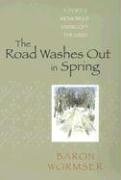University Press of New England
Road Washes Out in Spring: A Poet's Memoir of Living Off the Grid
Regular price
$12.95 USD
Regular price
Sale price
$12.95 USD
Unit price
per
Shipping calculated at checkout.
Couldn't load pickup availability
Title: Road Washes Out in Spring: A Poet's Memoir of Living Off the Grid
Author: Baron Wormser
E: 1700717
ISBN: 9781584656074
Publisher: University Press of New England
Published: 2006
Binding: Hardcover
Language: English
Edition: 3rd prt.
Number of Pages: 199
Section: Biography & Autobiography | Personal Memoirs
Condition Note: Excellent, unmarked copy with little wear and tight binding. We ship in recyclable American-made mailers. 100% money-back guarantee on all orders.
Publisher Description: For nearly twenty-five years, poet Baron Wormser and his family lived in a house in Maine with no electricity or running water. They grew much of their own food, carried water by hand, and read by the light of kerosene lamps. They considered themselves part of the back to the land movement, but their choice to live off the grid was neither statement nor protest: they simply had built their house too far from the road and could not afford to bring in power lines. Over the years, they settled in to a life that centered on what Thoreau called the essential facts. In this graceful meditation, Wormser similarly spurns ideology in favor of observation, exploration, and reflection. When we look for one thread of motive, he writes, we are, in all likelihood, deceiving ourselves. His refusal to be satisfied with the obvious explanation, the single thread of motive, makes him a keen and sympathetic observer of his neighbors and community, a perceptive reader of poetry and literature, and an honest and unselfconscious analyst of his own responses to the natural world. The result is a series of candid personal essays on community and isolation, nature, civilization, and poetry. them. Wood heat was bearable; the lack of a refrigerator was a bother but bearable; but an outhouse was not bearable. Even a pleasantly appointed outhouse like ours, a two-seater with screened windows that offered a view of the piney woods that sloped down to the road and that stood at the end of a winding path lined with ferns and striped maples, was still an indignity. Even an outhouse with a sizable overhang to keep off the weather and a toilet paper holder that consisted of a nail on the back wall that was high up enough to deter mice from nesting in the roll was still an outhouse. Even an outhouse that displayed a laminated invitation to a Paris Review cocktail party and that had a bucket of lime in it to throw on what was gathering below to kill off any offensive odors was still an outhouse. 'What about January?' people would ask. You could feel the dread in their voices.

